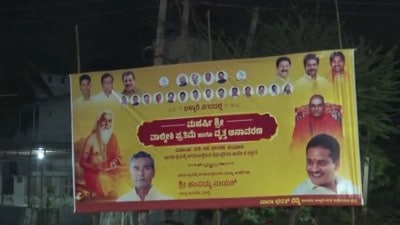Sister act
You don't need to be an expert to know that Asha Bhosle is the pivot around which her household revolves. Straightening the sofa cover and...

You don8217;t need to be an expert to know that Asha Bhosle is the pivot around which her household revolves. Straightening the sofa cover and stacking magazines in order, she asks you to sit. No this is not attitude. Purely making you feel at home. Without making it seem like she is going out of her way, she asks you in a typical motherly fashion: quot;Have you eaten?quot; All your embarrassed entreaties are pushed aside as you sit to gobble the sumptuous thali.
So where do you begin? Yes, the award in Lata Didi8217;s name could be as good a place as any to begin. quot;I don8217;t think I want to talk about the award,quot; she says and quickly adds, seeing your raised eye-brows: quot;It is not that I don8217;t respect the Maharashtra government8217;s decision to honour me, but haven8217;t I spoken enough about that already?quot; But was Didi8217;s absence the cause of this unhappiness? quot;All that you people want is masala,quot; she rebukes but goes on, quot;she must have had her reasons to stay away. How am I to know? Maybe someday you should ask her.quot; She, however, maintains that she is happy to have received the award in the birth centenary year of her father, Master Dinanath Mangeshkar. It was perhaps these thoughts that led her to donate the entire Rs one lakh she got in the award to the Dinanath Mangeshkar Hospital coming up in Pune.
She fidgets with the tassles on her saree pallu. quot;Why donacirc;euro;trade;t we talk about something else8230;quot; she trails off.
From the impoverished struggle for a place in the cut-throat industry, to the accolades from gushing multitudes, this queen of Grandma-Rap has seen it all. She goes back in time to her initial recordings, when she began her career in 1943. quot;I used to travel in a third class compartment to distant Mumbai from Goregaon. Once I got off, I would scurry to the fish market for the exact variety my temperamental husband wanted,quot; she remembers, with a smile. quot;I have always had a thing for good food. Perhaps my children have taken after me. All of them are gluttons when it comes to good food. Particularly seafood.
A perfect Virgo, the immaculate attention to detail which makes her such delightful cook is what makes her good at mimicry too. From Sudhir Phadke to Lata Didi to younger sister Usha, she can do them all. quot;It is something that I was born with. No amount of punishment from Mai her mother could cure me of it,quot; she chuckles, pointing out it stood her in good stead while giving various heroinesacirc;euro;trade; playback. quot;For example, Meena Kumari would hardly open her mouth when she spoke, so when I sang I would also keep my mouth open just a bit. But with Sharmila I could sing with gusto.quot; She illustrates with Jaaiye aap kahan jayenge, with her lower jaw jutting out just that bit. quot;You guess who that is,quot; she guffaws.
Unlike her Didi and other singers of her time, she never stuck to genre. Was it a conscious decision? quot;In the beginning, I just wanted opportunities and would take up whatever came my way. There was no chance of being choosy as every penny counted,quot; she says with faraway look. quot;By the time I got to a position where I could become choosy, people already knew me as a versatile singer.quot; She smiles sadly, quot;perhaps that8217;s why they would come to me at the eleventh hour, whenever a singer didn8217;t turn up.
She waxes eloquent on her private album Meraj-e-Ghazal with Ghulam Ali. quot;Though HMV did not do justice to its marketing, it brought me a lot of attention as a singer, since the ghazals were technical both in from and content,quot; she points out. It was that album which brought her to the notice of Khayyam who was looking for a voice for Umrao Jaan. quot;He made me sing in the lowest octave I could and told me in no uncertain terms that he will only take me if I could go a full three octaves lower,quot; she remembers. She took it up as a challenge and the rest is history.
But the National Award for Best Female Playback Singer in 1983 for Umrao8230; was just the beginning. Ijazat saw her in full form again. quot;Those songs will always remain very close to my heart,quot; she admits, remembering how Pancham R D Burman had rebuked Gulzar on first seeing the lyrics of Mera kuch saaman8230; quot;Pancham asked him, acirc;euro;tilde;Next, will you bring me a telegram someone sends you?acirc;euro;trade;,quot; she remembers. The second National Award for Playback came for this film. At a time when people were beginning to think that she had moved to serious singing and her pop streak had faded, she surprised everyone by taking the nation by storm with her Mujhko hui na khabar Dil To Pagal Hai, Jaanam samjha karo and the recent Mujhe Rang De Thakshak.
So, is she beginning to enjoy all the attention that private albums bring? quot;The first time it felt funny, but all the youngsters were really sweet,quot; she says modestly. Hasn8217;t anyone told this woman how terrific she is on screen? quot;Blame it on my mimicry skills,quot; she says but stops short of telling you which actress she is doing in her videos. And is there a difference between today8217;s music and the yesteryears8217;? quot;Like the difference between a three-course thali and paanipuri. The later may be more savoury, but it8217;s also short-lived 8212; not to speak of its ill-effects, if not prepared well.quot;
Finally, is there one song of hers which she feels embodies and reflects her own struggles and her life. quot;There have been many but Samay ho in Rudaali makes me feel a lump in my throat.quot; And how she got to sing that one song in a film dominated by LataDidi is a different story altogether.
- 01
- 02
- 03
- 04
- 05































